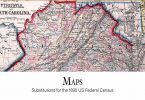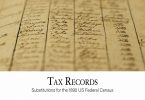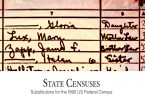Without the 1890 US federal census, it can be challenging to get an accurate picture of your family during the period from 1880 to 1900. A lot of things can happen in a family during that time, but you might not have any idea what, except for a few tantalizing clues in other census records that the 1890 one would have proven. The good news is that there are alternatives to this frustratingly missing census that you can use to get the information you need to fill in the gaps on your family tree. This is one of them.
While it is not the 1890 US federal census, there is a special schedule from that census that has survived and can be quite useful to genealogists. That schedule is known as the 1890 Veterans Census or Veterans Schedule. There are almost 75,000 names in this schedule. If you have Civil War ancestors, they may be in it.
This schedule was ordered to enumerate Union veterans and the widows of Union veterans, but some Confederate veterans and widows made it into the schedules, as well. This enumeration was requested by the US Pension Office to assist Union veterans and their widows in locating people who had served with the veterans and who could help pension claims go through by testifying on behalf of the veteran or widow who was applying for the pension. Other, less publicized uses for this census was to allow the government to determine the number of Civil War veterans and widows for pension legislation purposes, and also for members of Congress to conduct an informal study into the effect of different types of military service on the longevity of the veterans.
The Pension Office put together a list of the names and addresses of veterans in order to send out enumerators. The names and addresses came from Pension Office files and, also, from the available records kept by the US War Department.
Today, most of the schedules from Alabama through Kansas, and about half of Kentucky, are not available, as they were destroyed before the rest of the schedules were sent to the National Archives in 1943. There are some fragments of the missing states that are still available in Bundle 198 at the National Archives and online on genealogy websites. If your Civil War veteran or widow ancestor lived in a state with a surviving schedule or in a place where a fragment survived, you are in excellent genealogical luck.
The information included on the schedules includes:
- Name of the veteran (which can include soldiers, sailors, and marines)
- Name of the widow, if the veteran was no longer on the planet.
- The rank of the veteran
- The name of the regiment or vessel in which the veteran served
- The date of enlistment
- The date of discharge
- The length of service
- Current address
- The disability incurred while in military service or because of it
- Remarks from the enumerator, veteran, and/or widow
This schedule can help you place ancestors who would otherwise have been on the 1890 US federal census. It can also give you the name of a veteran’s widow, which is useful in situations where female names have proved challenging to find. It can even be used to trace a Civil War veteran to their place of birth, which is super useful in locating their parents and other ancestors for your family tree.






